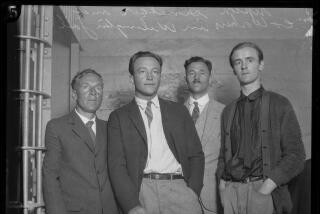A Commitment That Never Flags : Freedom House’s fight for global human rights
- Share via
Freedom House, celebrating the start of its second half-century, was founded in 1942 by Wendell Wilkie, Eleanor Roosevelt, Fiorello LaGuardia, Herbert Agar and others in a coalition determined to talk the United States out of its isolationism.
Every year, the New York City-based foundation publishes a political survey rating every state on the globe as “free,” “partly free” or “not free.” The direction over the last generation has been unmistakable: from 44 free in 1972 to 57 in 1983 to 99 in 1992, eight more than the previous year. Another seven may enter the top group soon.
The inexorability of the overall movement, however, does not mean that each step forward is irreversible. This year’s total in the Freedom House free category is up, and yet in the former Soviet Union a number of countries have moved down: Estonia, Latvia and Russia from free to partly free; Tajikistan, Turkmenistan and Uzbekistan from partly free to not free. On the brighter side, Ukraine, free in 1992, is still free, and Georgia has moved up to partly free.
UNHOLY UNIONS: Freedom House supports a small phalanx of area experts available for consultation by (within broad limits) all and sundry. Professors, journalists and diplomats are the usual clients. But behind the somewhat academic look of the report and the established air of a 50-year-old foundation, Freedom House remains a lobby. What is it lobbying for just now?
In 1942, the threat to world freedom was the expansionist fascism of Hitler, Hirohito and Mussolini. In calling the United States out of its isolationism, Freedom House was summoning it to meet an external threat. And in the meeting of that threat, alliances of convenience--above all, the alliance with the Soviet Union--were inescapable.
When World War II gave way to the Cold War, militant communism replaced militant fascism as the principal threat to freedom, Stalin’s Soviet Union replacing Hitler’s Germany as the most dangerous single foe. But this was, again, an external threat, and, again, it was met by alliances of convenience. In the struggle against communism, the United States often and actively supported authoritarian regimes on the Freedom House “not free” list.
A DIFFERENT DANGER: And now? With the second superpower divided, if not conquered, and in a state of economic collapse, the threat to freedom takes the form of manifold threats within separate nation-states around the world. To meet these threats, says R. Bruce McColm, head of Freedom House, President-elect Bill Clinton must “foster a new engagement with . . . the human rights community, which traditionally acts as a pressure group to limit or condition assistance to human rights violators. . . . “
In the days when maintaining a common front against the Soviet threat had to be the preeminent concern of American foreign policy, human rights activists were often seen more as annoyance than as resource. Those days are now past, however, and the venerable lobby deserves praise for, once again, nudging Washington gently but firmly in the right direction.
More to Read
Sign up for Essential California
The most important California stories and recommendations in your inbox every morning.
You may occasionally receive promotional content from the Los Angeles Times.










